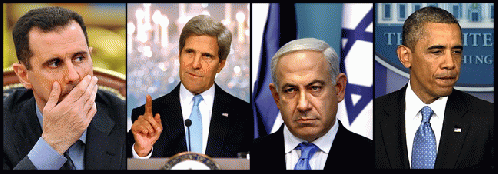- Jonathan Granoff, President, Global Security Institute
Watching news coverage of the debate over bombing Syria, one realizes there's more going on than Barack Obama or John Kerry are telling Congress and the American people. Kerry may have sworn to tell the truth, the whole truth and nothing but the truth to the Senate Foreign Relations Committee -- but that doesn't mean he has to tell the whole story.
The fact is there's an elephant in the room everyone involved seems sworn to never mention. Or if it slips out, it suddenly gets silenced. That elephant is Israel.
Consider this little mind game: What if Syria and the rest of the volatile Middle East did not surround the tiny state of Israel? Would we still need to bomb Syria? With the Arab world in an uproar right now, tensions are especially high in Israel, thanks to its iron-walled determination to sustain a military occupation over native Palestinians.
Let's extend this mind game: What if Israel had been established in the early 20th century on the Africa continent between Chad and Darfur, which is in western Sudan. Imagine that Sudanese President Omar al-Bashir had voiced hatred for this tiny neighbor populated by refugees from Europe. When Bashir took up slaughtering many thousands of Darfurians, would the president of the United States have sent in cruise missiles -- instead of what he did, which was nothing? In fact, while the US president damned Bashir's slaughter on one hand, US Pentagon and Intelligence operatives met with Sudan's chief military intelligence officers to iron out cooperation against terrorism. (In the hunt for al Qaeda, let's not forget how Bill Clinton actually sent cruise missiles into Sudan to blew up what turned out to be a civilian pharmaceutical plant. It was a big embarrassment.)
Then there's the very recent case of Egypt, whose military units purposely gunned down over 1000 students and other pro-democracy demonstrators in the streets and wounded or locked up many thousands more. Why this did not rise to the level of an "atrocity" in need of "accountability" is a mystery. But, then, I'm more a moralist than a blind US patriot.
Actually, I'm being intentionally disingenuous, here, since I -- and many other Americans -- do understand what's going on. It's not really a mystery. It's the international variant on that tried-and-true American standby, selective enforcement or selective accountability. You know how it works: You have all sorts of laws or "red lines" on the books that you only enforce against those you don't like. It's actually quite elegant. For those you do like, the law is either ignored or there is some mitigating condition. In the case of the Egyptian military, that mitigating condition is the US government's purchase of loyalty with annual donations of cash rooted in a pact to keep the Egyptian military friendly with Israel.
Equally compelling, there was no call to attack Egypt because our leaders liked what their Egyptian military friends were doing, which was to unseat the Muslim Brotherhood party that rose to power democratically and to brutally crush the Brotherhood movement once-and-for-all across the nation. It's true, they did not use chemicals to kill their people. But dead is dead.
Selective accountability doesn't take into consideration the hypocrisy factor of the present US government outrage when we have used white phosphorus, napalm and chemically volatile weapons like agent orange and depleted uranium shells for decades to kill people, many of them civilians. The same goes for all those coordinates and bombing instructions we gave Iraq intelligence so the Iraqis could drop sarin gas on Iranians at least three times during the Iran-Iraq War. That was OK because it turned the war around in favor of our ally, the man who would only later become the arch-villain Saddam Hussein.
Israel is at the center of both the Egypt story and the Syria story. Israel's role since the Cold War era has been as an outpost of US imperialism in the Middle East, a role that is becoming ever more difficult to sustain as the region comes unglued. In fact, Israel's role vis-a-vis the US is so tricky it's often relegated to the realm of secrecy; in many ways it has become a relationship that demands silence.
The Israeli lobby -- The American Israel Public Affairs Committee (AIPAC) -- was recently described by a White House operative as "the 800 pound gorilla in the room" when it came to selling the bombing of Syria. AIPAC's argument is that if Syria is not attacked, Iran will be emboldened. Once the "gorilla" remark appeared in The New York Times, a funny thing happened. It subsequently disappeared in all future editions and on the NYT website. Someone had gotten to The Times and all mention of AIPAC was scrubbed from the story.
The recent history is interesting. According to a Financial Times article, in 2007 Israel shifted its position on Syrian President Bashar al-Assad from accepting the "devil they knew" to wanting him removed. His links with Hezbollah and Iran were the reason. "Removing Syria from the Iranian axis is seen as an overwhelming Israeli interest," The Financial Times reported. Former Israeli Deputy Prime Minster Avigdor Lieberman said the collapse of the Assad regime "would be a severe blow to Iran's subversive activities in the region, given that Assad's Syria serves as a forward base [for Iran]."
Pressure from Israel explains a lot about the intensity of the Obama Administration's call to bomb Assad and Syria. A broken up and fragmented Syria would not necessarily be friendly to Israel, but it's considered by Israeli leaders (including, The Financial Times says, Prime Minister Benjamin Netanyahu) much less of a threat to the Zionist state than an Assad-dominated Syria.
Does this constitute Israel as "the tail wagging the US dog"? That's a subjective metaphoric call. All we know is tiny Israel is a significant factor in the mix, and it's consistently held up as a militarist model for attacking "terrorism." This even though in comparison to tiny Israel, the US is a massive continent-size nation with friends to its north and south and vast oceans to the east and west. That is, it has nothing at all in common with tiny Israel -- unless you see Israel as a US imperial outpost in a hostile region.
(Note: You can view every article as one long page if you sign up as an Advocate Member, or higher).





